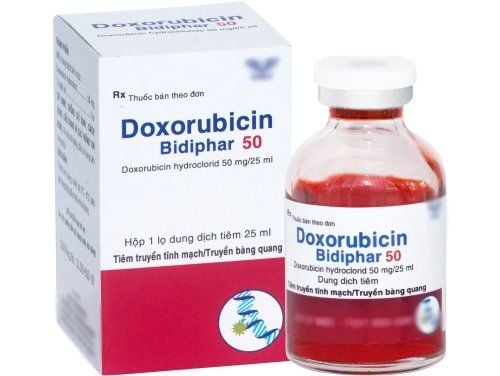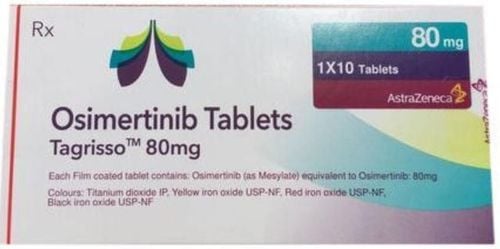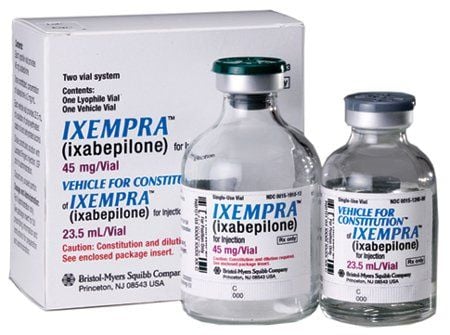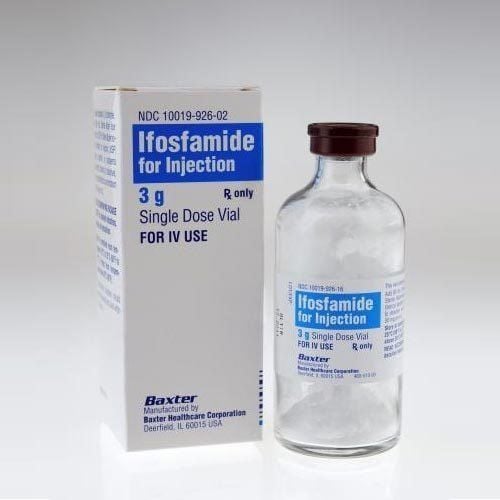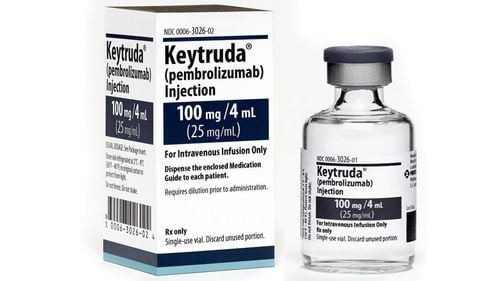This is an automatically translated article.
Atezolizumab is an immunomodulatory cancer drug. By helping immune cells better kill cancer cells, Atezolizumab is indicated for many different types of cancer. However, some adverse effects may be encountered when treated with Atezolizumab to varying degrees.
1. What is Atezolizumab?
Atezolizumab is an immunomodulatory drug. Atezolizumab's primary indication is as a cancer drug of choice. Atezolizumab binds to the PD-L1 protein to help immune cells better kill cancer cells and is used to treat many different types of cancer, including cancers that are overexpressing. PD-L1. It is a monoclonal antibody and an immune checkpoint inhibitor. In practice, Atezolizumab is used as monotherapy or in combination with other drugs to treat certain types of malignancies, such as hepatocellular carcinoma, non-small cell lung cancer, and lung cancer. small cell, breast cancer and bladder carcinoma.The route of administration of atezolizumab is to be used as an intravenous infusion. During the first infusion of atezolizumab, the infusion time should be at least one hour. If there is no response to the drug, the patient can reduce the time of the next infusion to 30 minutes.
Timing of atezolizumab infusion is every 3 weeks. The duration of treatment with atezolizumab can be up to 2 years if it still ensures the effectiveness of a cancer drug as well as the side effects that do not affect the patient's tolerance too much.
MORE: Lung cancer drug Afatinib: What you need to know
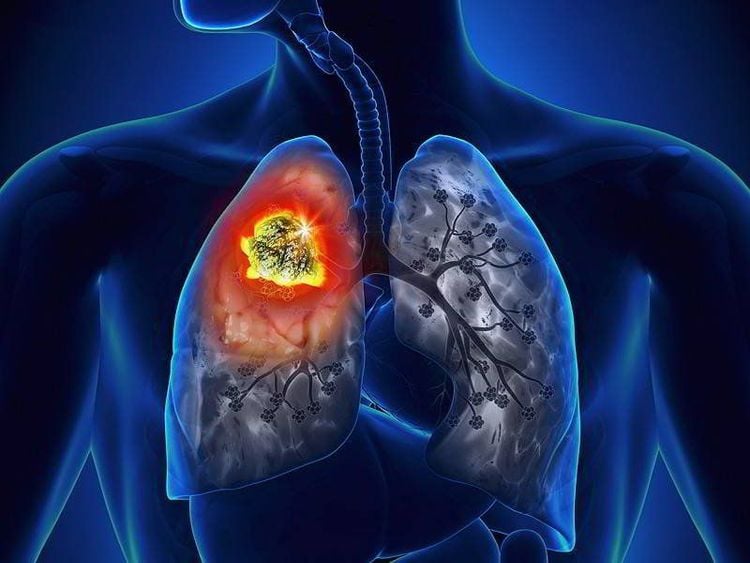
Thuốc Atezolizumab hỗ trợ điều trị một số loại u ác tính như ung thư phổi không tế bào nhỏ
2.Indications of the drug Atezolizumab
Atezolizumab is approved to treat:Breast cancer with the protein PD-L1. Atezolizumab is used with the albumin-stable nanoparticle formulation of paclitaxel in adults with cancer that is locally advanced, metastatic, or cannot be removed by surgery. Hepatocellular carcinoma (a type of liver cancer) has metastasized or cannot be removed with surgery. Atezolizumab is used together with bevacizumab in patients who have not received systemic therapy. Melanoma has certain mutations in the BRAF gene. Atezolizumab is used with cobimetinib fumarate and vemurafenib in adults with cancer that is metastatic or cannot be removed by surgery. Non-small cell lung cancer that has metastasized. Atezolizumab is used as first-line therapy in adults with cancers that have the PD-L1 protein and do not have mutations in the EGFR gene or the ALK gene. Small cell lung cancer. Atezolizumab is used with carboplatin and etoposide as first-line therapy in adults with advanced cancer. Bladder adenocarcinoma is locally advanced or has metastasized. Atezolizumab is used in adults with cancer that has the PD-L1 protein and cannot be treated with cisplatin, cannot treat the cancer with other chemotherapy drugs, or has gotten worse during or after treatment. by chemotherapy.

Ung thư biểu mô tế bào gan được chỉ định dùng thuốc Atezolizumab
3.Atezolizumab side effects
Atezolizumab can cause serious side effects, including:
Pneumonia: Signs and symptoms of pneumonia may include new or worsening cough, shortness of breath and chest pain Hepatitis: Symptoms of hepatitis may include yellowing of the skin or sclera of the eyes, poor appetite, severe nausea or vomiting, pain on the right side of the stomach, drowsiness, dark urine, spontaneous bleeding or bruising easier than usual. Colitis: Signs and symptoms of colitis may include diarrhea or more frequent bowel movements than usual, blood or mucus in the stool or stools that are dark, tarry, sticky strings, and pain or tenderness in the area. Severe stomach hormone problems (especially thyroid, adrenal, pancreas, and pituitary gland): Symptoms that the hormone glands are not working properly can include headaches, fatigue, and fatigue. , weight gain or loss, dizziness or fainting, feeling more hungry or thirsty than usual, hair loss, changes in mood or behavior (such as decreased sex drive, irritability or forgetfulness), feelings feeling cold, constipated, a deeper voice, urinating more often than usual, nausea or vomiting, and stomach pain. Problems in other organs: Signs and symptoms may include severe muscle weakness, numbness or tingling in the arms or legs, confusion, blurred vision, double vision, or other vision problems, mood or behavior changes, extreme sensitivity to light, stiff neck, painful or red eyes, blistering or peeling skin, chest pain, irregular heartbeat, trouble breathing or swollen ankles Severe infection : Signs and symptoms of infection may include fever, cough, flu-like symptoms, pain with urination and frequent urination or back pain Serious infusion reaction: Signs and symptoms of Infusion reactions may include chills or shaking, itching or rash, flushing, trouble breathing or wheezing, swelling of the face or lips, dizziness, fever, feeling like you've passed out, and back or neck pain .

Sử dụng thuốc Atezolizumab có thể gây ra các tác dụng phụ như viêm đại tràng
4. Things to note when treating with Atezolizumab
It is important for doctors to check for cancer with regular visits to make sure that the medicine is working well. Blood and urine tests may be needed to check for unwanted effects. If administered atezolizumab during pregnancy can harm the unborn baby. Therefore, if the patient is female and could become pregnant, your doctor may order a pregnancy test before you start using this medicine to make sure that you are not pregnant. Use an effective form of birth control to prevent pregnancy during treatment with this medicine and for at least 5 months after the last dose. If you think you have become pregnant during treatment with Atezolizumab medicine, tell your doctor right away.Tell your doctor if you have a cough, chest tightness or any shortness of breath during the infusion. These could be symptoms of a serious lung problem (eg, pneumonia, interstitial lung disease). Also, tell your doctor if you have pain or tenderness in your upper abdomen, pale stools, dark urine, loss of appetite, nausea, unusual tiredness or weakness, yellow eyes or skin. These could be symptoms of a serious liver problem.
Colitis can occur with Atezolizumab . Tell your doctor if you have abdominal pain, watery or bloody diarrhea, or a fever after the infusion. Adrenal, pituitary, or thyroid problems may occur while you are taking this medicine. Therefore, you should let your doctor know if you have changes in mood or behavior, constipation, dry skin or hair, feeling cold, sensitive to heat, sweating, trouble sleeping, or weight changes. .

Một số trường hợp cần xét nghiệm máu và nước tiểu để kiểm tra các tác dụng không mong muốn của thuốc
Atezolizumab may affect blood sugar levels. Check with your doctor if you notice a change in your blood or urine sugar test results. In case of headache, confusion, convulsions, stiff neck or vomiting while taking this medicine, it is important to tell your doctor as these could be symptoms of encephalitis, meningitis. Atezolizumab can cause myocarditis. Patients should consult a doctor if they have chest pain or discomfort, fever, chills, fast heartbeat, or trouble breathing.
Call your doctor if you have a cough that won't go away, weight loss, night sweats, fever, chills, painful or difficult urination, or flu-like symptoms, such as a runny or stuffy nose , headache, blurred vision, or general feeling of being ill. These could be signs that the person has an infection.
Atezolizumab can cause a rare but serious type of allergic reaction called an infusion reaction, which can be life-threatening and requires immediate medical attention. As such, tell your doctor if you have a skin rash, dizziness, trouble breathing, chest tightness, swelling of your face or hands, fever, or chills.
Serious skin reactions (eg, exfoliative dermatitis, Stevens-Johnson syndrome, drug rash with eosinophilia and systemic syndrome or toxic epidermal necrolysis may occur with the drug. Atezolizumab Patients should seek immediate medical attention if blistering, peeling, chills, cough, diarrhea, itching, joint or muscle pain, irritated red eyes, red skin lesions, often central purple color, severe acne or skin rash, sore throat, sores or sores on the skin, mouth or lips, swollen glands, unusual bleeding or bruising, or unusual tiredness or weakness. Atezolizumab may increase the risk of organ rejection, so it should be avoided in patients with a history of previous organ transplantation. Also, talk to your doctor before receiving this medicine if you plan to have children. Some women treated with Atezolizumab may delay becoming pregnant or become infertile
In summary, Atezolizumab can block PD-L1 and help the immune system destroy cells. cancer. Patients are usually prescribed atezolizumab infusion after chemotherapy or, if chemotherapy is not possible, alone or in combination with other drugs. Because the side effects of Atezolizumab are common, it is necessary to support and care for patients after taking the drug to ensure effective cancer control.
Please dial HOTLINE for more information or register for an appointment HERE. Download MyVinmec app to make appointments faster and to manage your bookings easily.
References: mayoclinic.org, tecentriq.com, cancer.gov, .webmd.com




